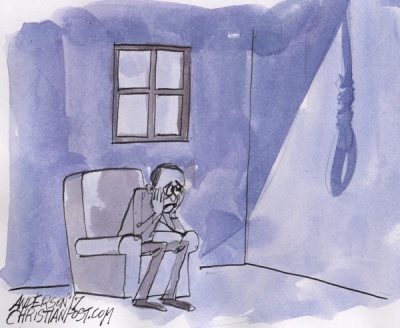To Save Lives, We Need to Start Talking About Suicide

Nothing strikes more fear and brokenness in the hearts of parents, loved ones and friends, than the thought of losing a loved one to suicide. Tragically, suicide is a real and terrible reality, and the church is not immune to its touch. Suicide is the 10th leading cause of death in the United States — the second for Americans aged 15 to 34. On average, 121 people commit suicide in America every day.
These statistics tell us there's a high chance most Christians in America have either watched families in their community suffer the terrible pain of losing a loved one to suicide or have experienced that darkness within their own family.
Yet, as prevalent as it is, suicide has been a topic we are afraid to discuss in our culture — even within the walls of the church. But we are finding that having that conversation saves lives. So we must talk about it.
The American Association of Christian Counselors (AACC), the Liberty University Graduate Counseling program, the Liberty University School of Medicine and the Executive Committee of the Southern Baptist Convention sponsored a recent LifeWay Research survey on suicide. The study polled pastors and churchgoers about their church's preparedness to help those at risk of suicide and those affected by the suicide of friends and loved ones. What we found was both encouraging and challenging: the church, as a whole, is an effective comforter during times of tragedy and hardship, but we struggle with knowing how to effectively step into the life of someone who might be on the verge of committing suicide.
Two in three pastors surveyed said they were underprepared to intervene in the life of someone suffering from mental health problems or thoughts of suicide. Lay-people considered themselves even less capable. Feeling unable to help, unsure of what to say or do, some may choose not to speak up when they suspect someone they know may be contemplating suicide. This is a tragedy, especially given the fact that for every successful suicide there are 25 suicide attempts. Every Sunday, people suffering from mental health problems are sitting in the pews of every church — pastors cannot afford to ignore this reality.
When asked about their ability to respond to the tragedy of a suicide, though, over 90 percent of pastors either strongly or somewhat agreed they were prepared. Churchgoers felt much more capable as well.
So why is there such a gap between the church's confidence in its ability to love and comfort the hurting family after a suicide versus caring for the hurting individual before they choose to end their life?
I believe the difference is knowledge.
It is imperative that the church work to destigmatize the negative perception of mental health issues in our communities. This begins through basic education on mental health and suicide. The church should also become aware of what resources are available and seek out the tools and training to identify when a person is struggling and which simple steps to take to connect them with help.
To aid this need, the AACC has created resources for clinicians, pastors, church leaders and lay-people to better understand suicide Prevention, Assessment, Intervention and Recovery, called PAIR. A general program is available to churches as well as concentrated curricula for those working with members of the armed forces, the elderly and adolescents.
It is not practical to assume that everyone should have the skills of an expert counselor, but every Christian does have a role to play. Jesus' love for us in our own brokenness stirs us to come alongside others to remind them of their worth and the truth of God's redemptive gospel, and apply the meaningful first aid of a hug and the simple phrase, "let me help you find help."
So many lives could be saved if the church was better equipped to address the hurts causing a person to feel like suicide is the only way out of a life wracked with hopelessness. The critical difference is knowing how to help.
Tim Clinton, Ed. D., LPC, LMFT is President of the nearly 50,000-member American Association of Christian Counselors, the largest and most diverse Christian counseling association in the world. The author of over 30 books, he is professor of counseling and pastoral care and executive director of the James C. Dobson Center for Child Development, Marriage and Family Studies at Liberty University. Follow him @DrTimClinton.




















